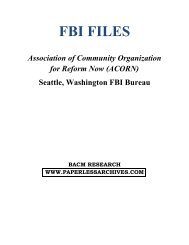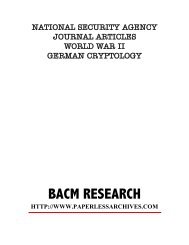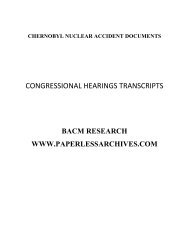Chernobyl Nuclear Power Plant CIA Files - Paperless Archives
Chernobyl Nuclear Power Plant CIA Files - Paperless Archives
Chernobyl Nuclear Power Plant CIA Files - Paperless Archives
Create successful ePaper yourself
Turn your PDF publications into a flip-book with our unique Google optimized e-Paper software.
The <strong>Chernobyl</strong>' Accident:<br />
Social and Political<br />
Implications ;,'<br />
Summary<br />
IlIforma/iun avai/ablr<br />
as uI J ~~mbrr 1987<br />
"'as usrd In /hls r~por/.<br />
The explosion of the <strong>Chernobyl</strong>' nuclear reactor in April 1986 presented a<br />
serious problem for Gorbachev's efforts to portray the new leadership as a<br />
reasonable and accountable government. The accident led to the emergence<br />
of nuclear energy policy as a significant public issue. Moscow's delay<br />
in reporting the accident to its people and neighbors left it open to charges<br />
of disregard for public health and eroded confidence in the regime. The<br />
psychological consequences of the <strong>Chernobyl</strong>' accident are likely to be long<br />
term and not limited to the immediately affected geographic areas.<br />
Soviet citizens-in contrast to their counterparts in the West-have not<br />
mounted a successful campaign against the 'development of nuclear power,<br />
but antinuclear sentiment is growing in the aftermath of the <strong>Chernobyl</strong>'<br />
accident. Some members of the elite with policy influence have much less<br />
confidence in the safety of the Soviet nuclear system. Even ordinary<br />
citizens apparently worry that the regime's determination to'rely more<br />
heavily on nuclear power will increase pressure on the nuclear sector to<br />
place growth above safety. They are reluctant to trust official assurances<br />
that safety alterations have been made and that existing safety rules will be<br />
enforced.<br />
J<br />
Regime claims that radiation fallout from <strong>Chernobyl</strong>' will not add<br />
significantly to the normal incidence of cancer have not silenced rumors<br />
and anxiety about health issues. A large segment of the population living in<br />
the European section of the USSR apparently believes it is in danger from<br />
radiation and continues to link genetic abnormalities, cancers, and poor<br />
health in general to the accident. These concerns are probably greatest<br />
among the 135,000 evacuees and more than 20,000 recovery workersmainly<br />
military reservists-nearly all of whom are non-Russians.<br />
-<br />
We have evidence of considerable fear of contaminated food and water that<br />
is likely to continue. The effects of this fear were still being felt in the farmers'<br />
markets this past summer, and Moscow probably is concerned that<br />
this apprehension could result in workers' resistance to transfers to the<br />
<strong>Chernobyl</strong>' region, an inability to sell products from the region, and<br />
increased demand for medical services<br />
,:' <strong>Chernobyl</strong>' also had an 'adverse impact on the regime's credibility. More<br />
, than a year after the accident, Soviet citizens continue to criticize top<br />
officials for initially concealing the <strong>Chernobyl</strong>' accident, and some think<br />
the regime's response to the disaster exposed the insincerity of Gorhachev's<br />
openness (glasnost) policy<br />
v<br />
Secret<br />
, 't •
















